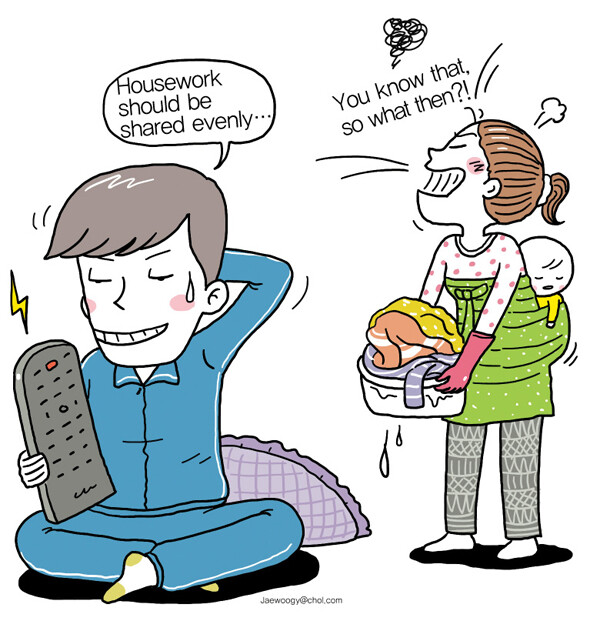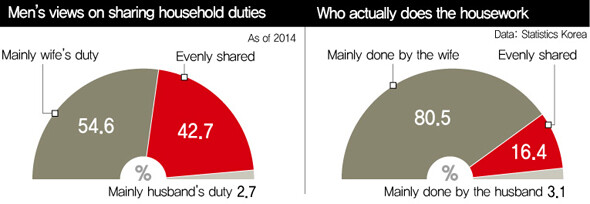hankyoreh
Links to other country sites 다른 나라 사이트 링크
On housework, S. Korean men believe in “fairness”…but don’t act that way

South Korean men believe husbands and wives should share housework fairly, but tend to actually leave most of it to their wives, recent numbers show.
The men were also found to have the fewest hours spent on household duties of any country in the Organization for Economic Co-operation and Development (OECD).
A report on home-life balance indicators for 2015 published by Statistics Korea on Dec. 7 showed 42.7% of male respondents over the age of 13 saying housework should be “divided up fairly” when asked for their opinion in 2014. The percentage arguing for equal division of labor has been rising steadily, although a majority of 54.6% still believed housework should “mainly” be the wife’s responsibility and 7% said the responsibility is “fully” the wife’s.

The number arguing for equal division had risen from 26.1% in a 2006 survey to 31.2% in 2010 before reaching 42.7% last year.
But instances of actual equal division of housework duties were rare, suggesting a gap between beliefs and behavior. A survey of couples over 19 who live together showed just 16.4% of men saying they shared equally in the housework, while 80.5% reported that it was “mainly handled” by the wife. This means the wife handles most or all of the duties for eight out of every ten couples that live together.
The rate of equal division has been rising. As recently as 2008, 89.4% of men said their wife mainly handled the housework, while only 8.7% reported sharing duties equally. The latest numbers show the rate of households where the woman performs most duties falling by 8.9 percentage points and the rate of equitable division rising by 7.7 percentage points.
Meanwhile, the average amount of time spent by South Korean men on housework per day clocked in at 45 minutes in 2009, the lowest number for any OECD member state. While men spent less than an hour on household duties, women spent an average of 227 minutes.
The gap of 182 minutes between women and men was larger in South Korea than in other countries. In contrast, it was comparatively small in northern European countries with highly developed welfare systems and high rates of economic participation by women: 31 minutes for Norway, 53 minutes for Sweden, 57 minutes for Denmark, and 73 minutes for Finland.
One drawback of the recent study is that it did not distinguish between dual-income and single-income households, which prevents an accurate assessment of perceptions and behaviors with regard to the division of household duties. In dual-income households, men are seen as more likely to share in the division of housework than in single-income ones.
“We need to have analysis and studies on the correlation between dual-income status and the division of household studies,” said Kim Young-ran, deputy director of the Statistics Korea social statistics bureau.
By Kim Kyung-rok, staff reporter
Please direct questions or comments to [english@hani.co.kr]
Editorial・opinion
![[Editorial] Intensifying US-China rivalry means Seoul must address uncertainty with Beijing sooner than later [Editorial] Intensifying US-China rivalry means Seoul must address uncertainty with Beijing sooner than later](https://flexible.img.hani.co.kr/flexible/normal/500/300/imgdb/original/2024/0517/8117159322045222.jpg) [Editorial] Intensifying US-China rivalry means Seoul must address uncertainty with Beijing sooner than later
[Editorial] Intensifying US-China rivalry means Seoul must address uncertainty with Beijing sooner than later![[Column] When ‘fairness’ means hate and violence [Column] When ‘fairness’ means hate and violence](https://flexible.img.hani.co.kr/flexible/normal/500/300/imgdb/original/2024/0516/7417158465908824.jpg) [Column] When ‘fairness’ means hate and violence
[Column] When ‘fairness’ means hate and violence- [Editorial] Yoon must stop abusing authority to shield himself from investigation
- [Column] US troop withdrawal from Korea could be the Acheson Line all over
- [Column] How to win back readers who’ve turned to YouTube for news
- [Column] Welcome to the president’s pity party
- [Editorial] Korea must respond firmly to Japan’s attempt to usurp Line
- [Editorial] Transfers of prosecutors investigating Korea’s first lady send chilling message
- [Column] Will Seoul’s ties with Moscow really recover on their own?
- [Column] Samsung’s ‘lost decade’ and Lee Jae-yong’s mismatched chopsticks
Most viewed articles
- 1For new generation of Chinese artists, discontent is disobedience
- 2[Editorial] Transfers of prosecutors investigating Korea’s first lady send chilling message
- 3[Column] US troop withdrawal from Korea could be the Acheson Line all over
- 4[Photo] 1,200 prospective teachers call death of teacher “social manslaughter”
- 5[Exclusive] Unearthed memo suggests Gwangju Uprising missing may have been cremated
- 6[Column] When ‘fairness’ means hate and violence
- 7Xi, Putin ‘oppose acts of military intimidation’ against N. Korea by US in joint statement
- 8S. Korea “monitoring developments” after report of secret Chinese police station in Seoul
- 9China calls US tariffs ‘madness,’ warns of full-on trade conflict
- 10[Editorial] Intensifying US-China rivalry means Seoul must address uncertainty with Beijing sooner t